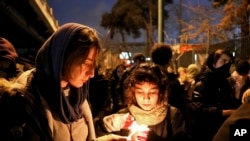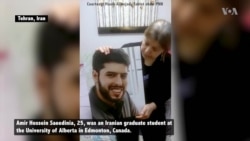The family of a young Iranian man who was killed when Iran shot down a passenger airplane in January said they were facing threats and intimidation following the death of their son.
Amir Hossein Saeedinia, a 25-year-old student at the University of Alberta in Canada, was one of the 176 passengers killed in the plane crash.
The family, which has reportedly fled to Canada, told VOA’s Persian service that Iranian officials coerced them to make statements in favor of the country’s supreme leader, Ali Khamenei.
“They closed the street and swarmed into our house,” said Masoud Saeedinia, Amir’s father, describing a visit by several Iranian officials to the family’s house in the city of Karaj, near the capital, Tehran.
“It was a clergyman accompanied by some other plain-clothed people. He ordered me to sit next to him and started threatening me without my knowing they were recording us,” he said.
The clergyman claimed to be a representative of the supreme leader.
“He started threatening me instead of apologizing [for my son’s death],” the father recalled.
According to the family, the Iranian official forced them to publicly thank Khamenei and other Iranian officials for their handling of the plane crash investigation.
The Ukrainian passenger plane was downed by the Iranian military shortly after takeoff from an airport in Tehran. After days of denial, the Iranian government admitted shooting down the commercial plane, triggering protests throughout the country.
The incident occurred hours after Iran’s Islamic Revolutionary Guard Corps (IRGC) launched ballistic missiles at Iraqi bases hosting U.S. troops in retaliation for the U.S. killing of top Iranian general Qassem Soleimani.
Abuse and harassment
Leyla Latifi, Saeedinia’s mother, spoke of how she and her sister were abused by Iranian security forces following her son’s death.
“They did not let us hold a proper funeral. They barred me from saying goodbye to my son. They did not even let me embrace his body and cry,” she told VOA, adding that government officials “put us under their thumb and were controlling us.”
Such events experienced by the Saeedinia family typify the way the Iranian government dealt with families of victims who spoke out against the government’s mishandling of the plane crash incident, local reports said.
Latifi added that her sister was jailed and sexually harassed for speaking out about Saeedinia’s death.
Fatima Latifi said that she “did some interviews with networks overseas and sent out videos and photos to keep them informed of our situation.”
As a result, Fatima said, she was taken into custody.
“They held me for 24 hours. I don’t want to say what happened to me then. I don’t want to elaborate on the details, but I can say I went through the worst things that could happen to a human. I went through a lot of bad vexations; sexual harassment,” the aunt said.
Seeking justice
Continued pressure and intimidation by Iranian authorities forced the family to make the bitter decision to flee the country.
“I escaped from Iran with my husband, my son, and my sister at night,” said Latifi, Saeedinia’s mother.
She said she included her sister in their flight, because “I knew that they would harass her again as soon as we got out of the country.”
Now in Edmonton, Canada, seeking asylum, the family wants to pursue justice for their son. But to do so, they said, they need help from Canadian authorities.
“I ask the Canadian Prime Minister [Justin Trudeau] to help us,” the aunt said. “We burned all bridges behind us when we revealed this information. We cannot return to Iran.”
Her sister, who has already filed a lawsuit against the Iranian government, added that those responsible for the killing of her son must be held accountable.
“I want Khamenei, the sly [Iranian President Hassan] Rouhani, [Foreign Minister Javad] Zarif and [IRGC officials Hossein] Salami and [Amir Ali] Hajizadeh to be prosecuted in international courts, and to receive the toughest punishments,” Saeedinia’s mother concluded.
VOA’s Persian service contributed to this report.






